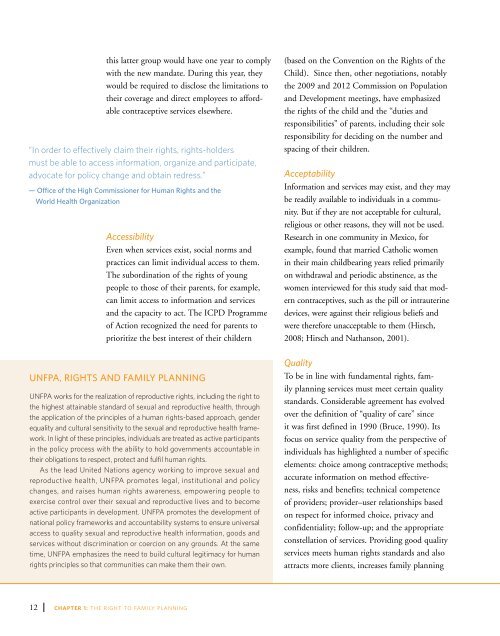State of World Population 2012 - Country Page List - UNFPA
State of World Population 2012 - Country Page List - UNFPA
State of World Population 2012 - Country Page List - UNFPA
You also want an ePaper? Increase the reach of your titles
YUMPU automatically turns print PDFs into web optimized ePapers that Google loves.
this latter group would have one year to comply<br />
with the new mandate. During this year, they<br />
would be required to disclose the limitations to<br />
their coverage and direct employees to affordable<br />
contraceptive services elsewhere.<br />
“In order to effectively claim their rights, rights-holders<br />
must be able to access information, organize and participate,<br />
advocate for policy change and obtain redress.”<br />
— Office <strong>of</strong> the High Commissioner for Human Rights and the<br />
<strong>World</strong> Health Organization<br />
Accessibility<br />
Even when services exist, social norms and<br />
practices can limit individual access to them.<br />
The subordination <strong>of</strong> the rights <strong>of</strong> young<br />
people to those <strong>of</strong> their parents, for example,<br />
can limit access to information and services<br />
and the capacity to act. The ICPD Programme<br />
<strong>of</strong> Action recognized the need for parents to<br />
prioritize the best interest <strong>of</strong> their childern<br />
(based on the Convention on the Rights <strong>of</strong> the<br />
Child). Since then, other negotiations, notably<br />
the 2009 and <strong>2012</strong> Commission on <strong>Population</strong><br />
and Development meetings, have emphasized<br />
the rights <strong>of</strong> the child and the “duties and<br />
responsibilities” <strong>of</strong> parents, including their sole<br />
responsibility for deciding on the number and<br />
spacing <strong>of</strong> their children.<br />
Acceptability<br />
Information and services may exist, and they may<br />
be readily available to individuals in a community.<br />
But if they are not acceptable for cultural,<br />
religious or other reasons, they will not be used.<br />
Research in one community in Mexico, for<br />
example, found that married Catholic women<br />
in their main childbearing years relied primarily<br />
on withdrawal and periodic abstinence, as the<br />
women interviewed for this study said that modern<br />
contraceptives, such as the pill or intrauterine<br />
devices, were against their religious beliefs and<br />
were therefore unacceptable to them (Hirsch,<br />
2008; Hirsch and Nathanson, 2001).<br />
<strong>UNFPA</strong>, rights and family planning<br />
<strong>UNFPA</strong> works for the realization <strong>of</strong> reproductive rights, including the right to<br />
the highest attainable standard <strong>of</strong> sexual and reproductive health, through<br />
the application <strong>of</strong> the principles <strong>of</strong> a human rights-based approach, gender<br />
equality and cultural sensitivity to the sexual and reproductive health framework.<br />
In light <strong>of</strong> these principles, individuals are treated as active participants<br />
in the policy process with the ability to hold governments accountable in<br />
their obligations to respect, protect and fulfil human rights.<br />
As the lead United Nations agency working to improve sexual and<br />
reproductive health, <strong>UNFPA</strong> promotes legal, institutional and policy<br />
changes, and raises human rights awareness, empowering people to<br />
exercise control over their sexual and reproductive lives and to become<br />
active participants in development. <strong>UNFPA</strong> promotes the development <strong>of</strong><br />
national policy frameworks and accountability systems to ensure universal<br />
access to quality sexual and reproductive health information, goods and<br />
services without discrimination or coercion on any grounds. At the same<br />
time, <strong>UNFPA</strong> emphasizes the need to build cultural legitimacy for human<br />
rights principles so that communities can make them their own.<br />
Quality<br />
To be in line with fundamental rights, family<br />
planning services must meet certain quality<br />
standards. Considerable agreement has evolved<br />
over the definition <strong>of</strong> “quality <strong>of</strong> care” since<br />
it was first defined in 1990 (Bruce, 1990). Its<br />
focus on service quality from the perspective <strong>of</strong><br />
individuals has highlighted a number <strong>of</strong> specific<br />
elements: choice among contraceptive methods;<br />
accurate information on method effectiveness,<br />
risks and benefits; technical competence<br />
<strong>of</strong> providers; provider–user relationships based<br />
on respect for informed choice, privacy and<br />
confidentiality; follow-up; and the appropriate<br />
constellation <strong>of</strong> services. Providing good quality<br />
services meets human rights standards and also<br />
attracts more clients, increases family planning<br />
12 CHAPTER 1: THE RIGHT TO FAMILY PLANNING
















